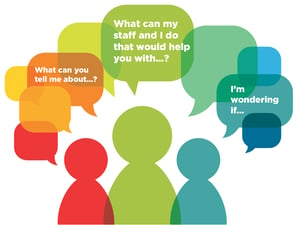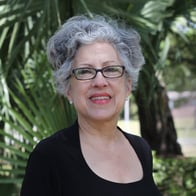Ever been asked that by your doctor? Or maybe you’re a provider who relies on that very question to gain a sense of your patient’s adherence to the regimen you’ve prescribed. Depending on which study you look at, somewhere between 25% - 31% of people decide not to fill a first prescription, and half of us on chronic medications stop taking them within a year. Patients have choices; you know already that it can be a pleasant surprise to learn that your patient has followed your advice! What goes into a person’s decision to fill or not fill, to adhere to their doctor’s recommendations or not?
 Well, it’s unlikely that a closed-ended question (like the title question above) that so obviously has a preferred answer - “Yes, I take them every day” - will allow a patient to feel emotionally safe enough to give a fully honest response. What isn’t productive is for the patient and provider to end up with a relationship that has more of a parent-child dynamic than a “partners in health” quality. No one wants to feel as though they’ve disappointed their provider (parent-child) or worse, merited another warning about the hazards of “noncompliance.” Patients don’t want to be fussed at, and admonishing patients is tiring and frequently futile for all involved.
Well, it’s unlikely that a closed-ended question (like the title question above) that so obviously has a preferred answer - “Yes, I take them every day” - will allow a patient to feel emotionally safe enough to give a fully honest response. What isn’t productive is for the patient and provider to end up with a relationship that has more of a parent-child dynamic than a “partners in health” quality. No one wants to feel as though they’ve disappointed their provider (parent-child) or worse, merited another warning about the hazards of “noncompliance.” Patients don’t want to be fussed at, and admonishing patients is tiring and frequently futile for all involved.
Look at this like any other habit you have - if what you’re doing now isn’t getting the results you want, it’s time to try something different. This is true whether you’re the prescriber or the patient.
Welcome to your new secret weapon - the open-ended question. How skilled are you at presenting your questions in a way that they cannot be answered with a short or one-word answer? (What you just read was an open-ended question, and they are a potent tool to have at your disposal.) Open-ended questions are instruments that open a conversation. Closed-ended questions create the opportunity for a person to get by with essentially a yes or no response : “Yes, I take my medicine just like you told me to.”
What's your favorite open-ended question for finding out whether or not a patient is taking their medication as described? Let us know here.
By the way - open-ended questions are perfect for those social situations where you feel a little out of place, shy, or just too weary to be “on”. “What made you decide to move here?” “Tell me what it’s like to be a landscaper / developer / work in a restaurant?” “Your trip to Spain sounded amazing! What do I need to know about travelling there?” They do the talking, you do the listening, and before you know it, the event’s over and you’re on your way!
Of course, whether you’re interacting with your patient or with a co-worker’s companion, open-ended questions yield useful information only when we are sincerely interested in hearing the person’s answer. We have to be willing to stop talking, then pay attention to what they say, without talking over them!
Try out a few open-ended questions that are phrased in a way that there is no obvious “correct” answer, with a demeanor that creates an atmosphere where your patient feels secure in revealing more of their reality:
“Life is so busy. It can be a challenge to take every medication every day. How many doses of medication would you say you miss in a typical week?” (“Forget to take” could be heard by the patient as a personal failure, making him less likely to be forthcoming. Asking instead how many doses were missed offers a patient the opportunity to save face due to a busy schedule, or for any other reason they report missing medication. Their response can yield information the two of you can create a plan around.)
Hearing this sort of phrasing from us, the patient senses she is not being criticized and admits that she misses two, five, ok, “I take it when I remember to.” Avoid the “should” language and follow up with another open-ended, non-judgmental question such as “What do you find gets in the way of taking them every day?” or “What would make it easier for you to take your medications every day?”
Now you’ve started an adult-to-adult conversation and created a collaborative atmosphere you both can build on. Is what we’ve prescribed beyond her budget? Too many of my patients have told me immediately, regretfully, after their office visit that they want to take but cannot afford to fill the prescription the provider just wrote, but they were too embarrassed to share that with the provider. Does she lack reliable transportation to the drug store? Patients have told me that relatives (!) charge them for a ride to the pharmacy. Is she experiencing what she perceives to be a side effect, so has decided to stop taking what was prescribed? Too many patients have told me, quite matter-of-factly, over the years, that they don’t “feel” any different on the medication, so why go to the trouble and expense of taking it? (We may need to do a better job of educating patients about what to expect.)
For patients on multiple medications who you suspect are not taking them as ordered: “Other patients have told me that it’s hard to keep up with all their medications, and I’m wondering if it ever feels that way to you.” (Note that a question does not have to end in a question mark.)
“What sort of help would you like to see from your family regarding…?”
“What can my staff and I do that would help you with…?”
“I’m wondering if…”
“What can you tell me about…?”
You get the idea. “Yes” or “no” questions foster a setting in which we talk at people rather than with them.
Presenting questions - to anyone - in a way they’ll feel safe sharing information, knowing they won’t be criticized or blamed - how much richer our patient interactions can be!
 Donna LaBrasca, M. Ed., CDE
Donna LaBrasca, M. Ed., CDE
Quality Assurance and Training Coordinator
Donna LaBrasca is the Quality Assurance and Training Coordinator at Equiscript. She spent her undergraduate years studying Psychology at Clemson University, then received a Master's degree in Counseling from The Citadel. Donna has been a Certified Diabetes Educator since 1989 and enjoys keeping up to date with new research. Reading, cooking, and BBC dramas are hobbies of Donna's. She has also been a Master Gardener almost three decades and even xeriscaped her yard!


